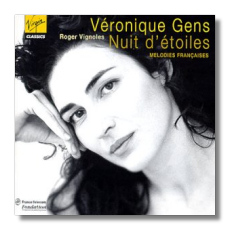
The Internet's Premier Classical Music Source
Related Links
- Latest Reviews
- More Reviews
-
By Composer
-
Collections
DVD & Blu-ray
Books
Concert Reviews
Articles/Interviews
Software
Audio
Search Amazon
Recommended Links
Site News
 CD Review
CD Review
Nuit d'étoiles - Mélodies Françaises

French Songs by Fauré, Debussy, and Poulenc
- Gabriel Fauré:
- Après un rêve, Op. 7 #1
- Sylvie, Op. 6 #3
- Au bord de l'eau, Op. 8 #1
- Lydia, Op. 4 #2
- Le papillon et la fleur, Op. 1 #1
- Mélodie de Venise "Mandoline", Op. 58 #1
- Clair de lune, Op. 46 #2
- Les berceaux, Op. 23 #1
- Claude Debussy:
- 3 Chansons de Bilitis
- Fêtes Galantes
- Nuit d'etoiles
- Beau soir
- Fleur des bles
- La Belle au bois dormant
- Noel des enfants qui n'ont plus de maison
- Francis Poulenc:
- Banalites
- 2 Melodies de Guillaume Apollinaire
- Les chemins de l'amour
Veronica Gens, soprano
Roger Vignoles, piano
EMI 45360 2
The heyday of the German art song may have been in the early 19th Century, but for France, it was undoubtedly the late 19th Century. Songs by Debussy, Chausson, and Fauré were lovely and lyrical, based on works of the era's best poets: the Symbolist Paul Verlaine, the melancholic Sully Prudhomme, the surrealist Guillaume Apollinaire. Debussy even wrote a few himself, such as the jingoist "Noel des enfants qui n'ont plus de maison." On this disc, Fauré is well represented by eight mélodies. His Clair de lune rivals Debussy's (also included). But it is his "Les Bearceaux" that Ms. Gens sings to heart-rending effect. Its rippling piano accompaniment simulates the rocking boats that the men take out the sea, its minor key tugs at the listener's sensibilité like the cradles tug at the men's boats leaving shore. Gens, fresh from her recording debut of Handel songs (Virgin 24354 52832), sings these songs as if they've been etched into her skin.
At first listening, Debussy's "Chansons de Bilitis" are not as immediately appealing as Fauré's songs. They seem less involving, perhaps because of their remote structure. First there is a text sequence of short lines, which gradually inflate into heightened lyrical intensity, then burst when hitting a key word. But the playful "Fantoches" with the puzzling "la la la" follows no such formula and is delightful, as is his version of "Clair de lune." Try to refrain from comparing it to Fauré's. Each thrives in its own lyrical realm: Fauré's evokes a vanished era of drawing room romanticism, Debussy's a keening, world-weary mal de siècle.
Gens artfully captures both Poulenc's conflicting senses of humor and abandonment in Apollinaire's Banalités. In "Montparnasse" Gens imparts a precisely vaunted inflection when the poet assumes the angel is "a lyric poet from Germany." Hyde Park" has a jaunty silly rhythm, while the "Paths of Love's" lugubrious dance rhythm mocks the sentimental lines "paths of the first day/divine paths of love." Throughout all these songs Gens is inventive and clever, although not so refined as the young Elly Ameling. She's well on her way, though. Her sense of drama is pronounced and never sinks to the histrionic.
Copyright © 2001, Peter Bates




















